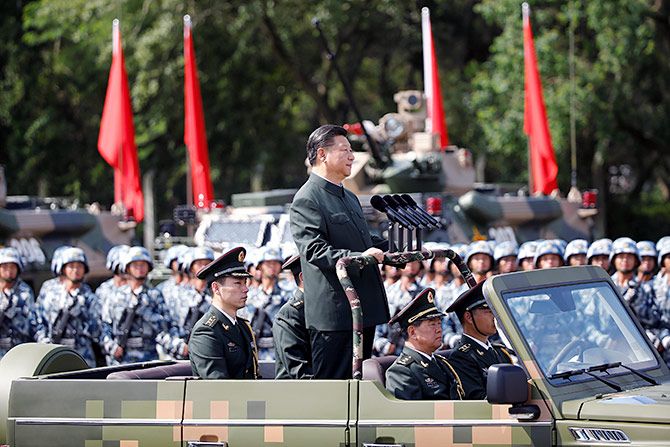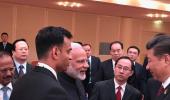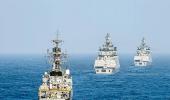'The military officers at China's National People's Congress reflect Xi Jinping's preference for elevating politically reliable, younger, officers with good professional qualifications,' says former RA&W officer and China expert Jayadeva Ranade.

IMAGE: Chinese President Xi Jinping inspects People's Liberation Army troops at the PLA's Hong Kong garrison, June 30, 2017. Photograph: Damir Sagolj/Reuters
There are some interesting sidelights in the selection of deputies representing the People's Liberation Army (PLA) and People's Armed Police Force (PAPF) at the 13th National People's Congress (NPC), the first session of which was held in Beijing from March 5 to 20, 2018.
Interesting is that despite the downsizing of the PLA by 300,000 personnel and the 'civilianisation' of a number of academics who had PLA ranks, the number of deputies has actually increased and at 269 is one more than in the last NPC.
The ratio of PLA deputies is one deputy for every 8,528 persons in the PLA in contrast to one deputy for every 435,511 civilians.
The PLA and the PAPF, which was brought under the Central Military Commission with effect from January 1, 2018, together sent 269 deputies of which 5 were from the PAPF.
Chinese media reports indicated that the Chinese Communist party's central committee carefully vetted the selection of deputies and that political reliability was the 'key' criteria.
The deputies representing the PLA/PAPF at this NPC reflect Chinese President Xi Jinping's preference for elevating politically reliable, younger, officers with good professional qualifications, experience of war or military operations other than war (MOOTW) and varied experience.
The average age of the PLA/PAP deputies is 50.4 years, or 2.7 years less than at the previous NPC.
There are 21 deputies of ethnic minority backgrounds with two each from the Tibetan and Uyghur ethnic minorities.
An analysis of the composition of the PLA/PAPF deputies reveals that the deputies represent 23 organisations of the Chinese armed forces with the departments directly under the CMC accounting for 37 deputies.
Anticipatedly the PLA Army (PLAA) has the maximum representation with 38 deputies.
This is followed by the PLA Navy (PLAN) with 18; PLA Air Force (PLAAF) with 16; PLA Rocket Force (PLARF) with 13; and the secretive PLA Strategic Support Force (PLASSF) with 3.
Three serving PLA theatre commanders are among the Deputies to the NPC. These are: PLAA General Zhao Zongqi, commander of the PLA western theatre command; PLAN Vice Admiral Yuan Yubai, commander of the PLA southern theatre command; General Wang Jiaocheng, former commander of the PLA southern theatre command; and General Liu Yuejun, commander of the PLA eastern theatre command.
Two political commissars of theatre commands are among the deputies namely, PLAA Lieutenant General Wu Shezhou, political commissar of the western theatre command, and Lieutenant General Fan Xiaojun, political commissar of the PLA northern theatre command.
PLAAF Lieutenant General Yi Xiaoguang -- who was appointed Commander of the crucial Central Theatre Command in October 2017, becoming the first PLAAF officer to be appointed a PLA theatre commander -- is not among the NPC deputies.
Yi Xiaoguang is, however, a member of the more important 19th central committee.
The emphasis on technical qualifications is noticeable with 85 deputies -- or 31.6% of the total number -- possessing professional technical backgrounds.
This is an increase of 2.5% over the representation at the previous NPC. The number confirms the emphasis being given by China's leadership to defence R&D and S&T and indigenous production of advanced weapons systems, warships, aircraft etc.
Noticeable also is the qualitative improvement in the educational and professional levels of the deputies with 148 of them having education qualifications at the research level.
90 deputies have received merit awards of PLA second class and above, and all have been described as 'outstanding in their areas of Chinese military'.
Interesting is the inclusion of Liu Wei, political commissar of the PAP garrison at Chongqing, among the deputies to the NPC.
It is indicative of the PAP's importance in matters relating to domestic and political security.
Chen Min’er, Politburo member and recently appointed party secretary of the centrally administered Chongqing municipality, said on the sidelines of the NPC session on March 6, 2018, that investigating former Politburo members Bo Xilai and Sun Zhengcai had removed 'major political hidden dangers for the party' and that 'both are the source of the pollution of the political ecology, and they massively harmed Chongqing's officials.'
'Everyone has heard that the evil legacy of Bo Xilai's thinking has yet to be purged, so we must purge it together with the pernicious influence of Sun Zhengcai,' Chen Min’er added.
General Wang Nin, a close associate of Xi Jinping and commander of the PAPF, had written in the Central Party School paper Study Times in October 2017 pointing to the PAP's task of ensuring national security, social stability and preventing unharmonious behavior in society'.
Jayadeva Ranade -- former additional secretary in the Cabinet Secretariat, Government of India -- is President, Centre for China Analysis and Strategy.











 © 2025
© 2025